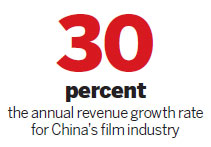DreamWorks to create $3.14b Shanghai center
Updated: 2012-08-08 14:34
By Shi Jing (China Daily)
|
|||||||||||

Asian operation to make the third Kung Fu Panda movie in China
DreamWorks Animation, the US film company, has announced plans to build a $3.14 billion theme park in Shanghai, to bolster its presence in the booming local entertainment market.
The studio's newly formed China joint venture, Oriental DreamWorks, is scheduled to open the theme park in 2016, said the creator of hits like Shrek and Kung Fu Panda.
Li Ruigang, the chief executive officer designate of Oriental DreamWorks, said the 20 billion yuan ($3.14 billion) project - being dubbed the Dream Center - will comprise entertainment centers, animation exhibitions and commercial developments, including hotels and shopping areas in Shanghai's Xuhui district.
|
Related readings: |
Oriental DreamWorks also announced it will make the next Kung Fu Panda movie, the third installment in the series, in China for release in 2016.
The ambitious move comes after Walt Disney, another US entertainment company, last year broke ground on its planned $3.7 billion theme park in Shanghai, which is scheduled to open in 2015.
The first two Kung Fu Panda films enjoyed great success in the Chinese market, and the second film took in 470 million yuan at the box office.
Li said the company plans to release up to three films a year and its first feature-length animated film is scheduled for global release in 2017.
Established with an initial investment of $330 million, Oriental DreamWorks is owned by DreamWorks Animation SKG, producer of the original Kung Fu Panda and other animated feature films, and its Chinese partners, which include three State-owned enterprises.
They are the Shanghai-based China Media Capital, Shanghai Media Group and Shanghai Alliance Investment Ltd, one of the largest cultural exchange and cooperation programs between China and foreign countries.
The Chinese companies will hold a 55 percent stake in the new company, while DreamWorks Animation will control the rest.
Li Ruigang, also chairman of China Media Capital, said the company aims to become the largest animation production base in China and explore opportunities in copyright distribution, consumer goods, online games and musicals in the hope of establishing a complete home entertainment industry chain.
Xiang Yong, deputy director of the cultural industry research institute at Peking University, added that for Chinese domestic animators, who have suffered from an extended recession, DreamWorks' entry into China brings a great chance to learn from an industry leader.
"The cultural industry should always target a global market. We can now adapt to having global competition on our own doorstep."
China's animation industry had its first heyday in the 1960s, when the film Uproar in Heaven was screened at renowned international film festivals.
But the industry has struggled of late, burdened by a lack of original ideas and professionals, said experts.
Some local animation firms said they are looking forward to learning from DreamWorks, especially from its world-leading 3D technology.
During a visit to Shanghai in March, Jeffrey Katzenberg, chief executive officer of DreamWorks Animation SKG, said the Shanghai studio will concentrate on stories that "have a connection to the culture, history and literature of China".
He also promised to bring the 3D technology that DreamWorks has developed during the past five years to Shanghai.
China has become one of the biggest film consumers in the world, as film industry revenues surge at an annual rate of 30 percent, said Zhang Pimin, deputy director of the State Administration of Radio, Film and Television.
China is also expected to become the second country in the world to have more than 10,000 movie screens by the end of 2012, following the US.
Katzenberg and Li both said on Tuesday that the Dream Center project will not be a threat to the Shanghai Disneyland.
"The Dream Center is different from any other large cultural project in China, including Disneyland," Li said.
Disney said in April it had joined an initiative to develop Chinese animation productions.
It will also co-produce Iron Man 3 in China with DMG Entertainment, as Hollywood seeks to tap into the fast-growing movie market.
Chinese box office revenue increased an annual 35 percent to $2 billion in 2011, making it the second-largest international market behind Japan, according to the Motion Picture Association of America.
AP and Xinhua contributed to this story.
Related Stories
Shooting from a new perspective 2012-08-01 11:04
Studio F 2012-07-25 13:55
Smile and take your own photo 2012-07-09 16:49
Ahn sets up Beijing studio 2012-05-08 11:17
DreamWorks Studios gets more financing 2012-04-11 09:43
Campus art works 2012-03-30 11:16
Today's Top News
President Xi confident in recovery from quake
H7N9 update: 104 cases, 21 deaths
Telecom workers restore links
Coal mine blast kills 18 in Jilin
Intl scholarship puts China on the map
More bird flu patients discharged
Gold loses sheen, but still a safe bet
US 'turns blind eye to human rights'
Hot Topics
Lunar probe , China growth forecasts, Emission rules get tougher, China seen through 'colored lens', International board,
Editor's Picks

|

|

|

|

|

|









